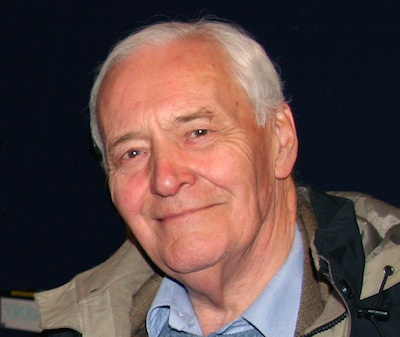
Former British cabinet minister and lifelong radical Tony Benn died today [Friday] at the age of 88.
He was a republican, advocating an end to the monarchy, and once campaigned to have the British Queen’s head removed from stamps. He introduced four Bills to Westminster committing Britain to withdraw from Ireland, all of which were rejected.
His republicanism and dealings with Sinn Fein long provoked controversy, particularly his invitations to Sinn Fein president Gerry Adams to come to Westminster.
Mr Adams described Mr Benn as a true friend of the Irish people following his support for a united Ireland.
“A principled politician and activist, he spoke up passionately for the idea of a united Ireland. He remained an avid supporter of Irish freedom throughout his life,” he said.
Asked in 1994 by a journalist for Socialist Organiser how he saw the central problem in Ireland, he answered thus.
“It’s a complicated problem. It’s a problem of the British conquest of Ireland. It’s a problem of settlement in Ireland. It’s a problem of economic interest at one stage, which I think has disappeared, in fact I think it’s now quite the opposite.
It’s a defence problem because of the attitude of the British during World War Two. And the American attitude has been firstly one of protecting Western approaches from the U-Boats and then seeing there was not an independent Ireland between themselves and the Red Army.
There’s a religious element in it. There’s a big class element in it, and trying to disentangle the ingredients of it and make sense of it all is quite complicated.
I think one of the reasons it’s difficult is because the question of Irish unity and the question of British jurisdiction are separate questions and they always try to present them as the same question. My understanding is that now the British want to get out. The Americans have got no interest apart from having an Irish-American population, which is pro-nationalist in general terms. The British have no economic interest in it.
Dublin has no interest in taking over the North. The last thing they want is to find Ian Paisley sitting in the Dail and Loyalist paramilitaries working in a United Ireland. Sinn Fein knows you can’t force the North into the South. I was trying to unpick it all and see if the bits of the jigsaw puzzle weren’t starting to become apparent.
If you are going to get a settlement, first of all you’ve got to have talks between the two communities in the North. That is absolutely essential. [Constitutional Nationalist leader, John] Hume has talked to Adams but now we’ve got to get Sinn Fein talking to everybody else. If you want the British out, you’ve got to think what the long-term relationship is going to be.
When the British government says that it has no economic or selfish interest in Northern Ireland, it must make it clear that there will be a point when British jurisdiction will end. The Bill which I’ve introduced puts this point at 31 December 1999 -- simply to put a marker so that people are starting to move to a new perspective. The thing that has got to be tackled if it is an Irish question -- which it is very largely -- and if the British occupation is no longer an issue, then how do you get things going?
What I’ve given is a sort of tour of the ingredients. I think it’s very important to understand all these different elements if we are going to be helpful and useful.
And in the end it is of course class, however you look at it, the poor Protestants and the poor Catholics, and the opening up of the possibility of some class unity within the context of an Irish solution. Then, if the North sorts itself out, its relationship with the South is less of a problem. You can imagine all sorts of arrangements. I don’t think that is a problem. The problem is the extrication of the British and the beginning of some serious discussion in the North about its future. I’ve telescoped it all, and it’s very simplistic, maybe, but that’s the way my mind is working.”
![[Irish Republican News]](https://republican-news.org/graphics/title_gifs/rn.gif)
![[Irish Republican News]](https://republican-news.org/graphics/title_gifs/harp.gif)

